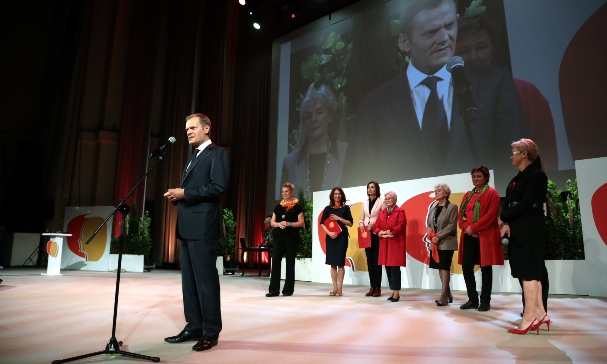
PM Tusk at Women's Congress, Saturday: photo - PAP/Tomasz Gzell
PM Tusk, a guest at the Congress on Saturday, said that his Council of Ministers agreed last Tuesday to ratify the convention against violence against women, despite reservations from conservative groups and Polish bishops.
Tusk noted though that during a process of consultations on the convention, he met with “ideological concerns and not entirely accurate concerns about [its] interpretation”.
Tusk, who leads the centre-right Civic Platform, was referring to a statement by Polish bishops at the Presidium of the Polish Episcopal Conference, which noted, “with great concern the announcement of the Prime Minister that the Polish government will sign without reservation the proposed Council of Europe Convention on preventing and combating violence against women and domestic violence.”
“The convention redefines gender as a social construct,” the bishops' statement added, “rather than as a distinction grounded in biology, and suggests violence towards women is systemic with roots in religion and culture.”
The convention was adopted by the Council of Europe Committee of Ministers on 7 April 2011 and opened for signature on 11 May 2011 on the occasion of the 121st Session of the Committee of Ministers in Istanbul.
The Council of Europe's convention - the first to offer an official definition of “gender” as being socially constructed - has been so far been signed by 21 states, and Turkey became the first to ratify it in March this year.
The convention characterizes violence against women as a violation of human rights and a form of discrimination, and nations should exercise due diligence when preventing violence, protecting victims and prosecuting perpetrators in domestic legislation.
'Loss of social energy'
In his speech to the Women's Congress in Warsaw, which was attended by Poland's First Lady Anna Komorowska among others, PM Tusk said that the limited participation of women in political and social life, is "a great loss of social energy".
The Women's Congress has called for 50 percent of political party electoral lists should include women candidates, though Tusk said he favoured the current, mandatory, 35 percent, claiming that there was already an "effective and informal" quota on electoral lists.
The Fourth Congress of Women, which ended Saturday evening, also demanded a liberalization of Poland's strict abortion law, to provide institutional care for young children, a state refund for IVF treatment, free contraception and education sex in schools.
The Women's Congress gave its annual 'Women of the Year' award to the 66 year-old Barbara Labuda, a democratic activist during the communist era and a member of the Women's Congress's 'shadow cabinet'. (pg)